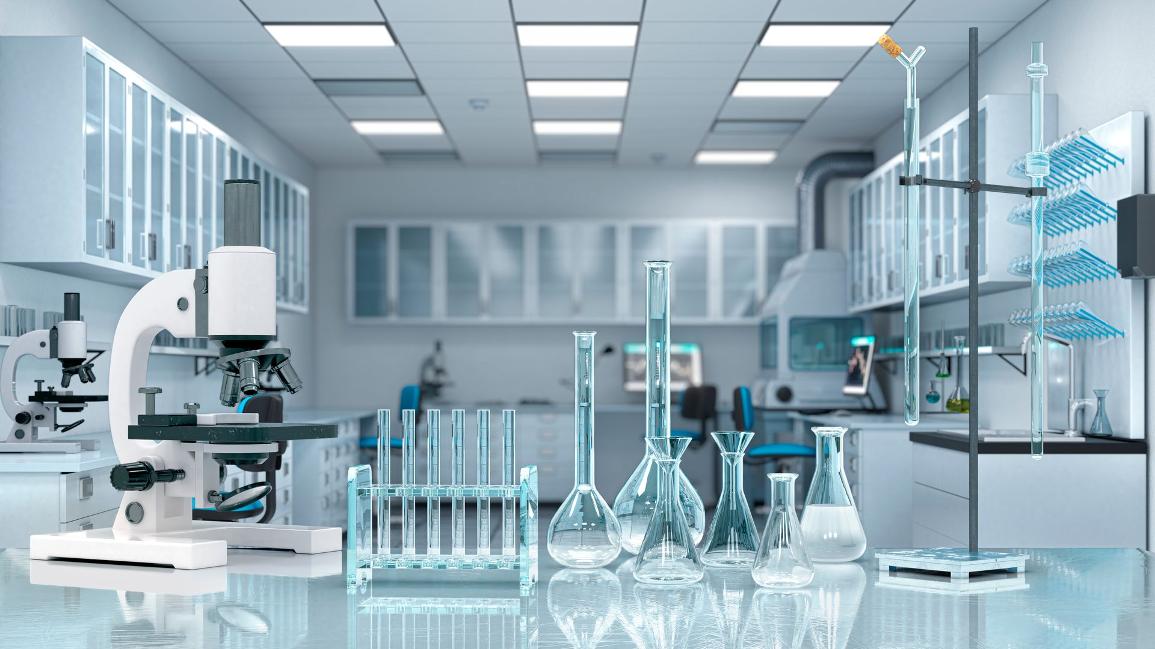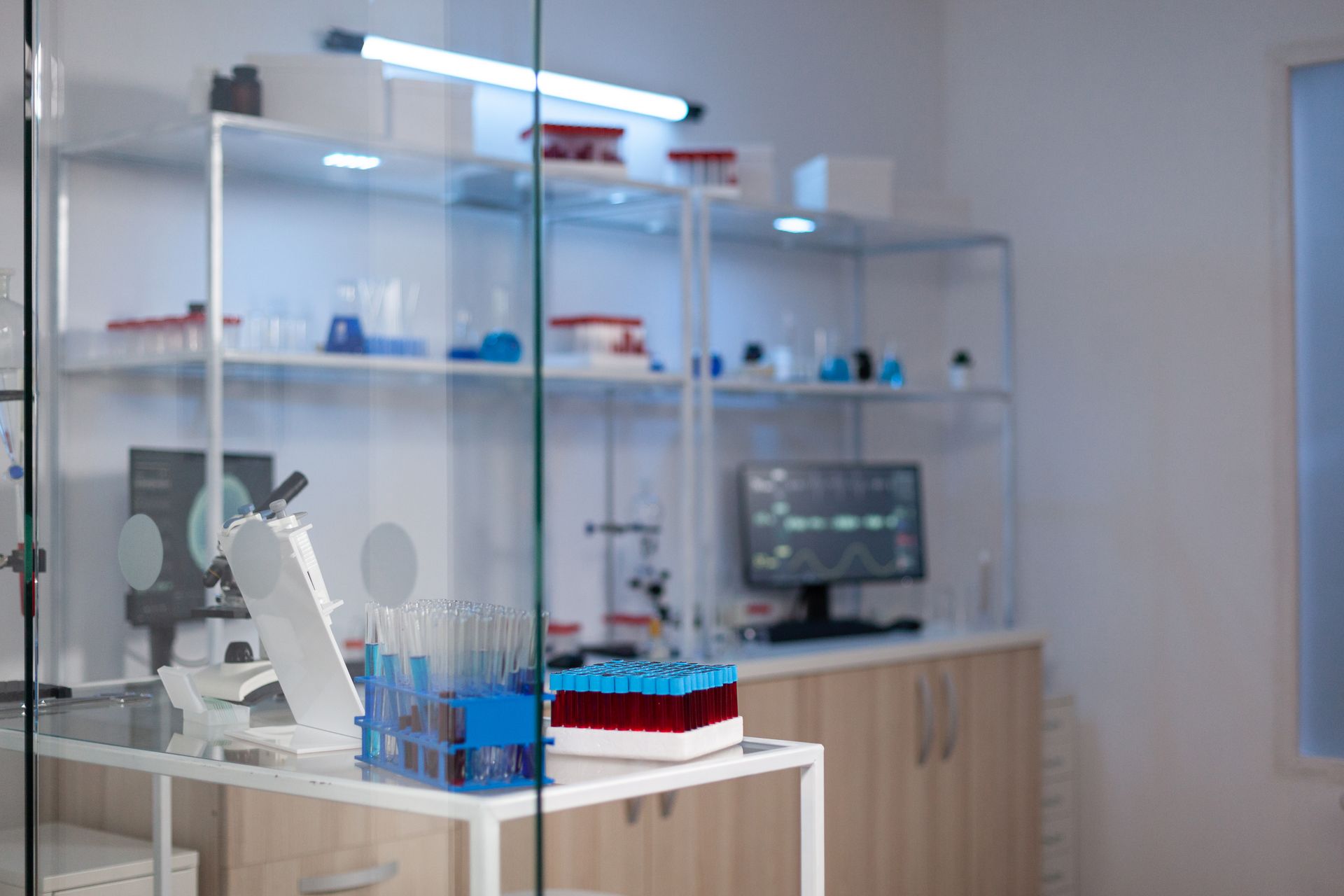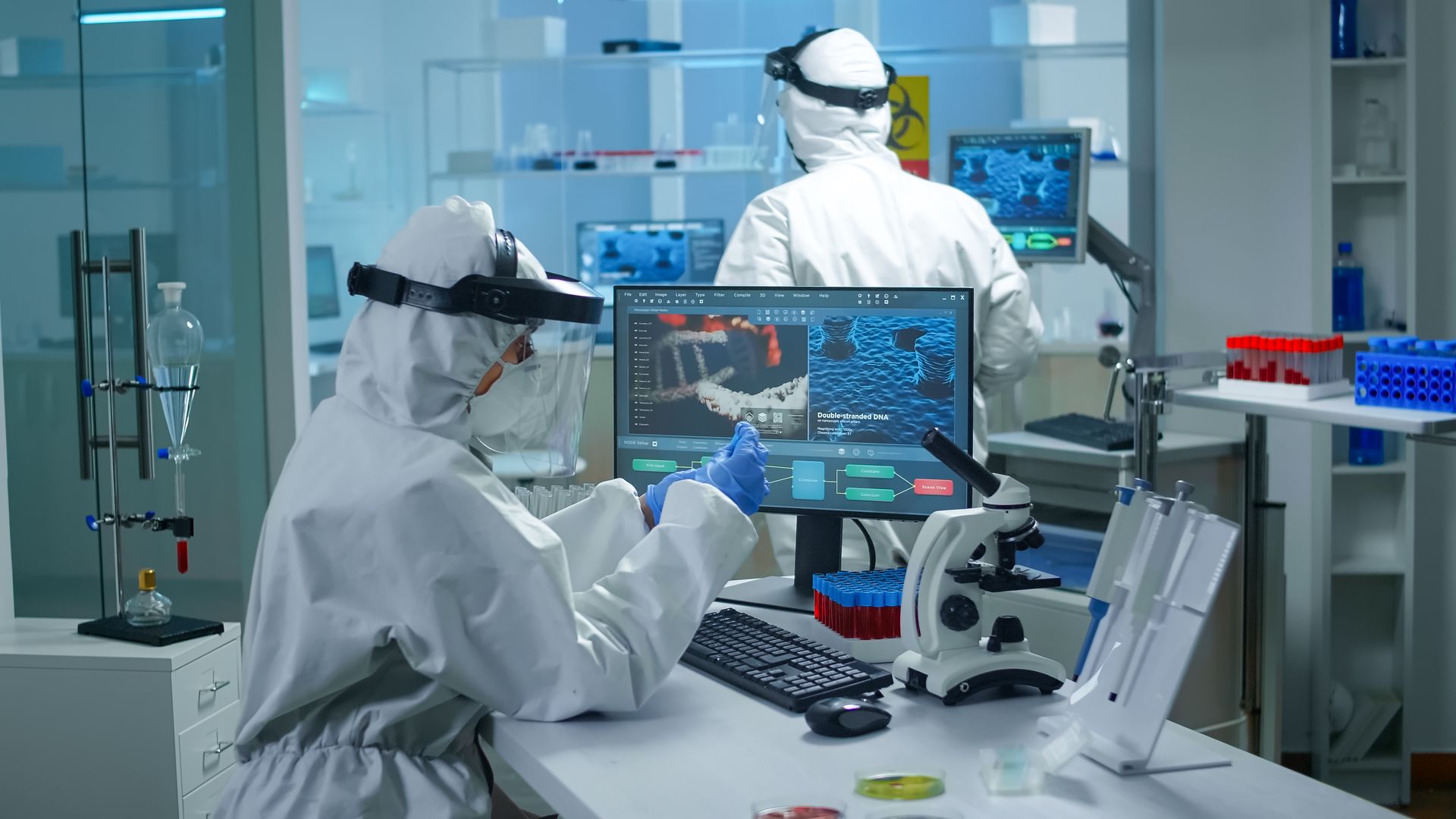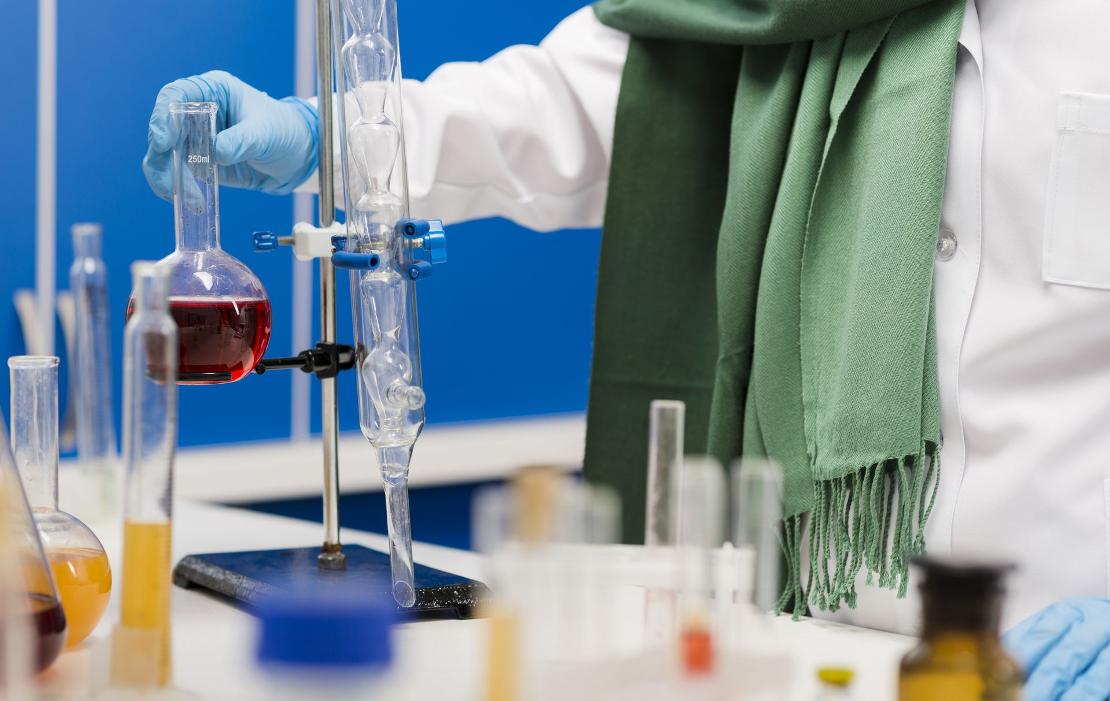Different Types of Chemistry Lab Equipment

What is laboratory equipment?
Laboratory equipment refers to the various tools, instruments, and devices used for scientific experiments, research, and analysis in laboratory settings. These tools can range from simple glassware to more complex equipment, which help scientists and researchers conduct experiments, make measurements, and analyse data in a controlled and precise manner.
What equipment is used in a chemistry lab?
There are many specialised tools and instruments used in different branches of chemistry and for various experiments and processes. Equipment and setups may vary depending on the nature of the research of analysis being conducted. Common tools and lab equipment in chemistry procedures include:
Fundamental Laboratory Equipment
These tools cover a broad range of applications, providing the basic infrastructure needed for scientific research and experimentation. Some of the most common fundamental equipment include:
Lab Refrigerators and Freezers
Different from standard ones found in homes and restaurants, lab refrigerators store temperature-sensitive biological samples, reagents, vaccines, and pharmaceutical products and ingredients. For storing vaccines, bio specimens, and medicines, there are specific refrigerators with backup batteries to keep them running for up to 72 hours in case of power failure.
Beakers
Used for mixing and holding chemicals during various stages of experiments, beakers come in various shapes to accommodate different volumes of liquid.
Test Tubes
A test tube is a non-reactive equipment used for safely conducting various experiments that require small-scale chemical reactions. It is also used for qualitative analysis.
Vials with Caps
Used for storing and transporting small quantities of liquids and solids. They must be capped at all times to secure the contents from spills, contamination, and evaporation.
Volumetric Flasks
Used for accurately measuring the specific volume of liquid materials, a volumetric flask is essential in procedures where precision is required for the success of the experiment. They generally measure liquids more accurately than graduated cylinders and beakers.
Graduated Cylinders
Also known as a measuring or mixing cylinder, a graduated cylinder is used for measuring the volume of liquids. It is not intended for mixing, stirring, heating, or weighing contents.
Bunsen Burners
A bunsen burner is a type of gas burner that produces a smokeless, non-luminous flame used for various laboratory experiments that involve heating, sterilisation, and combustion.
Heating Mantles and Plates
Compared to bunsen burners, heating mantles and plates are electrically powered devices designed for controlled and uniform heating, making them ideal for precise temperature-dependent reactions such as distillations and reflux.
Burettes and Pipettes
These are thin tubes both used to transfer small volumes of liquids. However, the key difference between them is in their release mechanisms, with burettes having a stopcock at the bottom and a pipette having a dropper-like system that releases liquid.
Ring Stands
A ring stand is used in conjunction with clamps as a stable support system to hold beakers and other glassware that cannot stand up on its own.
Lab Clamps
Also called a utility clamp or test tube clamp, a lab clamp has many different forms and functions in the chemistry laboratory. Generally, they are used to support and stabilise other equipment or glassware in the experiment setup.
Funnels
Used to pour substances or liquids like powders into vessels with small openings.
Crucible Tongs
These types of tongs are for lifting hot crucibles, flasks, or other items during the heating process.
Stir Bars
Stir bars, or spin bars, are small, oval-shaped Teflon-covered magnets used to stir solutions. They are used in conjunction with a stir motor where the container is placed and drives the stirring motion of the liquid inside.
Wash Bottles
Wash bottles, as the name suggests, are used for washing or rinsing pieces of glassware or plasticware, such as beakers, flasks, jars, or other laboratory instruments. In some cases, they are also used to fill volumetric flasks.
Distillation Equipment
Used to separate or purify components of a liquid mixture in pharmaceutical, chemical, or food processing industries. Distillation tools include rotary evaporators, reflux condensers, and vacuum distillation apparatuses.
Specialised Lab Instruments
Analytical Balances
Also known as a laboratory balance or weighing balance, it is used for accurately weighing applications of small samples or materials. Analytical balances are widely utilised in laboratories, educational settings, manufacturing industries, or any environment where accurate and rapid weighing is required.
Ball Mills
Ball mills are mainly used in laboratories for crushing and grinding sample materials into an extremely fine form. Across International has high-energy ball mills that grind down materials to sub-micron level in minutes.
Mass Spectrometer
An analytical tool used for measuring the masses of atoms and molecules present in a sample.
Recirculating Chillers and Heaters
Recirculator machines are used for circulating liquids to maintain low or high temperatures. Temperature control differs depending on the type of machine.
Chromatograph
Separates and analyses complex mixtures of substances to identify and quantify components in a sample in chemistry and biochemistry procedures.
Safety Equipment
Medical Face Masks and Wipes
Across International offers ASTM Level 3 medical face masks and wipes to provide users protection from contamination or infection when handling biological materials, potentially harmful chemicals, and samples.
Biosafety Cabinets (BSCs)
BSCs provide a safe and sterile workspace when working with hazardous biological substances. With their positive pressure design, BSCs prevent the release of biohazardous materials into the environment and minimise the risk of accidental exposures and spills.
Personal Protective Equipment (PPE)
Protective eyewear and clothing such as lab coats, gloves, safety goggles, and face shields are required to be worn at all times in any laboratory space where physical, biological, or chemical hazards are present.
Lab Furniture and Accessories
Workbenches
Lab workbenches are specialised tables or surfaces specially designed for laboratories. These benches and tables have chemical-resistant surfaces to withstand exposure to various reagents and substances. A chemical-resistant surface helps avoid cross-contamination between experiments.
Lab Carts
Specifically designed to transport laboratory instruments, chemicals, as well as other materials in the lab.
Wash Stations
Wash stations are built for sanitation and decontamination of tools, glassware, and personal protective equipment and are a crucial component of laboratory settings. They typically contain eye wash stations to provide immediate flushing of the eyes in case of accidental exposure to hazardous materials.

Maintenance and Care
- Conduct regular visual inspections to identify any signs of wear, damage, or malfunction. Setting a schedule for routine maintenance can help to prevent unexpected breakdowns.
- Regularly calibrate equipment such as weighing scales to maintain accuracy. Calibration should be done according to manufacturer specifications or industry standards.
- Clean the tools regularly using appropriate cleaning agents and according to manufacturer guidelines.
- Ensure proper usage and procedures on all the equipment to prevent misuse or damage.
- Have spare parts on hand or ensure that you have access to laboratory technicians in case of equipment failures or breakdowns.
- Store and operate equipment within specified environmental parameters.
Trends and Innovations
Automation and Robotics
With the continuous advancement of technology over the recent years, the use of automation and robotics in laboratory settings are increasing to streamline tasks and reduce human errors. Automated analytical instruments are also used to enhance productivity, allowing scientists and researchers to focus on data interpretation and scientific innovation.
Environmentally Friendly Solutions
One notable trend in modern laboratories is the adoption of environmentally friendly practices. Researchers are progressively embracing the use of sustainable materials such as biodegradable consumables, recyclable plastics, and eco-friendly solvents.
Single-Use Technologies
In bioanalytical and bioprocessing applications, disposable instruments such as bioreactors, chromatography columns, and pipettes are gaining traction as they eliminate the need for cleaning. This not only improves safety and efficiency but also minimises the risks of contamination.
Artificial Intelligence (AI)
In this era of AI, machine learning algorithms are revolutionising predictive capabilities, accelerating drug discoveries, and unravelling complex chemical interactions. AI-powered models are becoming the yardstick that guides researchers in specific procedures and solutions, which leads to more efficient chemistry practices.
3D Printing
3D printing has recently emerged as a transformative technology in a chemistry lab due to the advantages it offers such as low fabrication cost, time efficiency, and flexibility to modify surfaces.

Buying Guide for Lab Supplies and Equipment
- Consider the types of experiments and procedures that will be performed in the laboratory and the specific equipment required for those tasks.
- Ensure that the equipment meets relevant quality and safety standards. Look for certifications from regulatory bodies or industry standards to guarantee its reliability, durability, and performance.
- Read reviews and seek recommendations from peers in the industry.
- Ensure that the new equipment is compatible with existing laboratory infrastructure and can be integrated into other instruments if required.
- Review the technical specifications of the equipment. Also check for any built-in safety features such as alarms as well as compliance with safety protocols.
- Consider the availability of spare parts and service support in case of maintenance.
- When it comes to budget considerations, assess the long-term costs of the equipment, including maintenance and consumables.
By carefully considering these factors, you can make an informed decision when purchasing chemistry laboratory equipment. Across International offers a wide range of lab tools and accessories that meet the stringent demands of modern chemistry labs. Incorporating the latest technological advancements, we provide cutting-edge tools that not only meet the highest industry standards but also contribute to the success of chemistry procedures across various fields.
